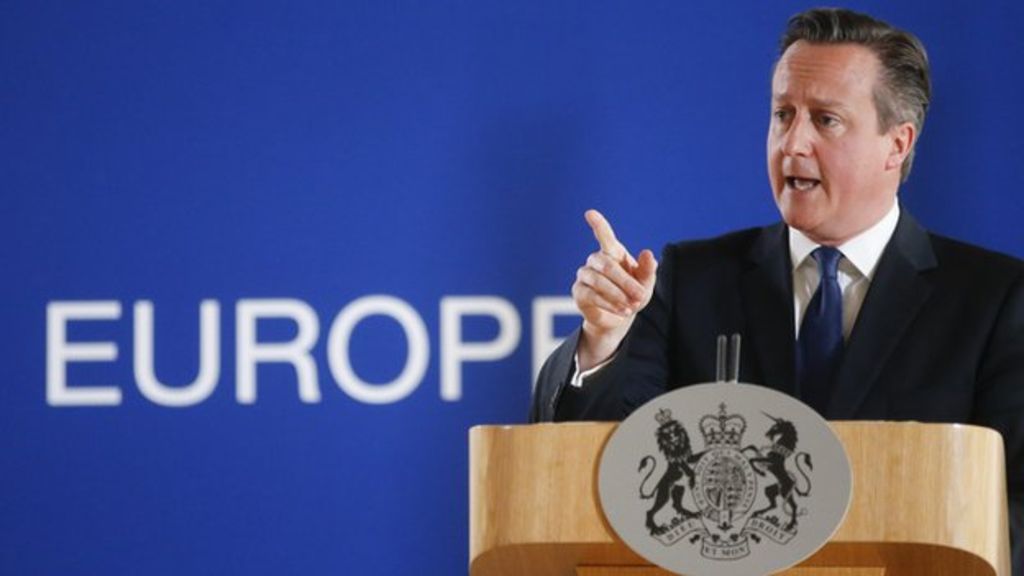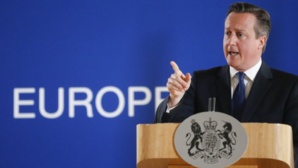B.B.C News reports that, as per David Cameron, the British voters, demanding a reform, are not going to acknowledge “‘rigid’ EU”, which is incapable of tackling the “Greek crisis”. However, the PM informed that if the union fails to be flexible it “would not work”.
David Cameron has launched the formal bid regarding the re-negotiation of the “UK's membership” which is to take prior to the “in/out membership” scheduled to be by the year of 2017. According to B.B.C writes that after the launch, Mr. Cameron said:
“...Greece would be likely to leave the euro if it rejects its bailout terms in a referendum.”
Greeks bank had already closed down before the day of election, which was decided because the talks held between international creditors and the government failed to come to an agreeable term. Mr. Cameron is of the opinion that Britain would profit the best if an agreement between “the eurozone” and the government of Greece took place. He expressed his views on a B.B.C. Radio show, whereby he stated:
"If they vote no, I find it hard to see how that's consistent with staying in the euro because there would be a very significant default and a very significant problem".
Furthermore, the EU also needs to be “flexible enough” whereby it will be able to work with either of the countries, the ones falling inside the eurozone and the ones outside it.
Moreover Cameron adds:
"If it can't show that flexibility it won't work as an organisation and I believe the British people will see that...This needs to have the flexibility of a network not the rigidity of a bloc."
He was also questioned in a summit on the rising demands of “reform” which is being lead by the “Greek and Mediterranean crises”. To which he informs that both these issues were discussed at length. In his words’:
"In the middle of that there was a brief discussion about the British situation," which "got a very good reception".
The PM emphasised on the fact that “every journey starts with a single step, as they say" although he looks forward to more negotiations that are to take place in the near future. However, “a successful negotiation would require ‘tenacity’", the PM mentioned while addressing the “MPs in the Commons”.
Nevertheless, when it comes to the Labour's acting leader, Harriet Harman, he still remains on unclear goals as far as the “other EU leaders” and “the British people” are concerned. In fact, B.B.C reports that:
“She asked him (PM) to confirm there was "no prospect" of changing the EU's treaties before the referendum takes place.”
It is said that the PM is likely to have accepted this argument, considering that to arrive at a change of treaty prior to the election session “may not be possible”.
However, in his response to Ms Harman, the PM pointed out that the things that mattered were:
"...making sure there's agreement with the substance of the changes that we seek - which of course will involve treaty change".
References:
http://www.bbc.com/news/uk-politics-33309281
David Cameron has launched the formal bid regarding the re-negotiation of the “UK's membership” which is to take prior to the “in/out membership” scheduled to be by the year of 2017. According to B.B.C writes that after the launch, Mr. Cameron said:
“...Greece would be likely to leave the euro if it rejects its bailout terms in a referendum.”
Greeks bank had already closed down before the day of election, which was decided because the talks held between international creditors and the government failed to come to an agreeable term. Mr. Cameron is of the opinion that Britain would profit the best if an agreement between “the eurozone” and the government of Greece took place. He expressed his views on a B.B.C. Radio show, whereby he stated:
"If they vote no, I find it hard to see how that's consistent with staying in the euro because there would be a very significant default and a very significant problem".
Furthermore, the EU also needs to be “flexible enough” whereby it will be able to work with either of the countries, the ones falling inside the eurozone and the ones outside it.
Moreover Cameron adds:
"If it can't show that flexibility it won't work as an organisation and I believe the British people will see that...This needs to have the flexibility of a network not the rigidity of a bloc."
He was also questioned in a summit on the rising demands of “reform” which is being lead by the “Greek and Mediterranean crises”. To which he informs that both these issues were discussed at length. In his words’:
"In the middle of that there was a brief discussion about the British situation," which "got a very good reception".
The PM emphasised on the fact that “every journey starts with a single step, as they say" although he looks forward to more negotiations that are to take place in the near future. However, “a successful negotiation would require ‘tenacity’", the PM mentioned while addressing the “MPs in the Commons”.
Nevertheless, when it comes to the Labour's acting leader, Harriet Harman, he still remains on unclear goals as far as the “other EU leaders” and “the British people” are concerned. In fact, B.B.C reports that:
“She asked him (PM) to confirm there was "no prospect" of changing the EU's treaties before the referendum takes place.”
It is said that the PM is likely to have accepted this argument, considering that to arrive at a change of treaty prior to the election session “may not be possible”.
However, in his response to Ms Harman, the PM pointed out that the things that mattered were:
"...making sure there's agreement with the substance of the changes that we seek - which of course will involve treaty change".
References:
http://www.bbc.com/news/uk-politics-33309281






